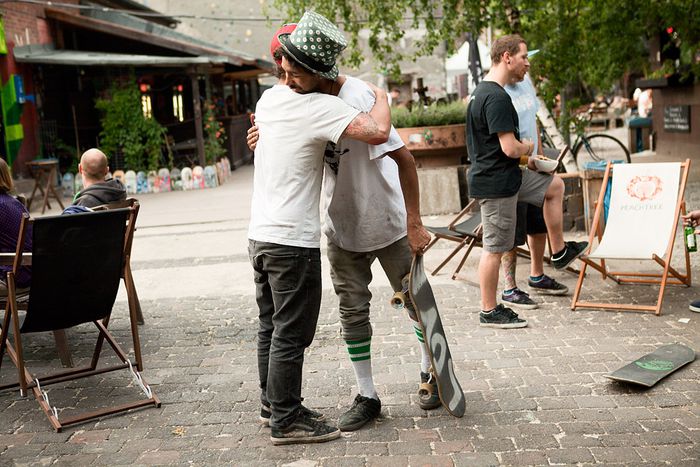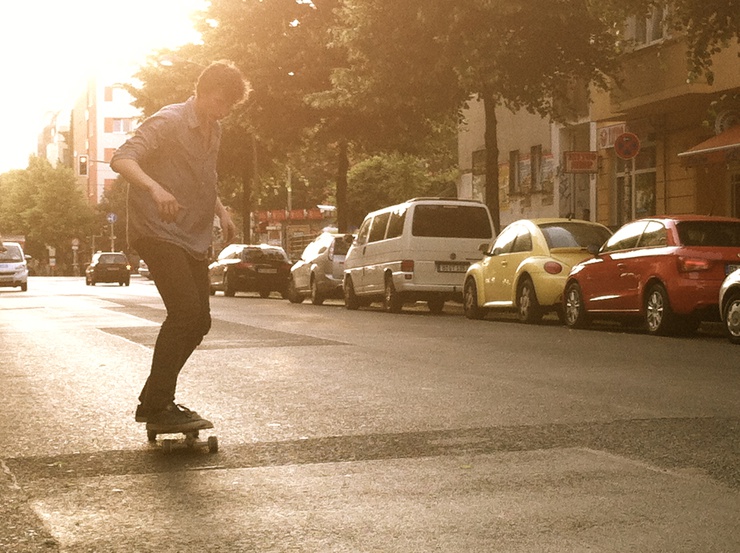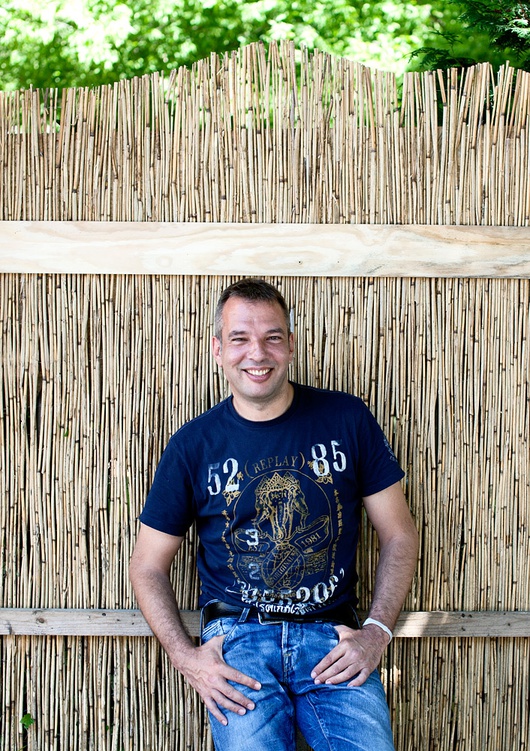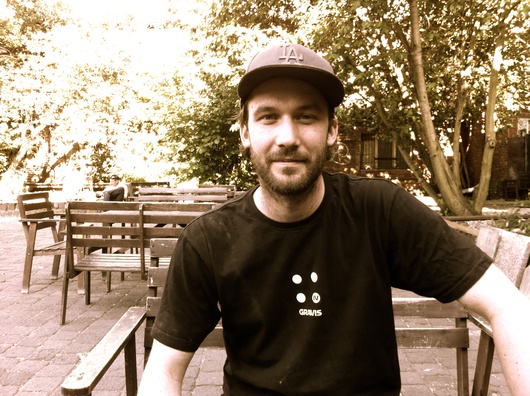
Skating: important sub-culture in multicultural Berlin
Published on
Translation by:
 C. O'Sullivan
C. O'Sullivan
In the wake of the success of a film documenting the rise of skateboarding in the German Democratic Republic (GDR), 'This Ain’t California', German skaters still define themselves as representatives of a certain sub-culture. This is another definition of multiculturalism in the city
Germany: early 1980s. Denis is a boy whose uneventful childhood is dominated by an authoritarian father who is determined to make his son a champion swimmer. One night, alerted by the sound of friction on the asphalt, Denis escapes out of the window of his apartment in Olvendest, near Magdeburg, and has his first encounter with a skateboard. Not long afterwards in 1985, Denis finally cracks, gives up ‘corporate sports’ and moves to East Berlin. There he becomes Panik, one of the most infamous and iconic skaters of East Germany.

Skateboarding in GDR: 'virus of American marketing'
There are hundreds of stories like this one. Many people between the ages of 30 and 40 can rattle off tales of a gloomy childhood under communist rule in the GDR. The difference is that Denis’ tale happens to be the basis of a film that has been enshrined in the history of the 2012 Berlin ('Dialogue In perspective' 2012 prizewinner) and Cannes independent film festivals ('best documentary' 2012). This Ain’t California tells of the childhood and adolescence of a group of kids, marginalised by a society that was more than a bit suspicious of any alternative to the daily norm. 'The GDR was a kind of politicised society that is difficult to imagine today. Kids had to learn the political anthems by heart, salute in front of the flag and march with the 'pioneers' of socialism every week,' said director Marten Persiel, who was in full promo-mode in New York at the time of the interview. For him, This Ain’t California is about 'a bunch of skaters who lived mostly below the radar of politics'. Take for example the scene in which the kids see a skater for the first time on a Slovakian television show - slated in the media as 'a virus of American marketing'.
 The film does not directly address the question of counter-culture, although it often shows that skateboarding in the GDR was in itself an act of civil disobedience - 'the streets in East Germany were not made for play'. Casually positioning himself in an Italian café opposite the headquarters of his production company Wildfremd, Michael Schöbel - one of the film's producers - would prefer to focus on the ontology of the skater rather than pedal a political message. ' When you're skateboarding, you spend all your time just two centimetres from the soil and the landscape scrolls by continuously,' he says. 'If you spend most of your life on a skateboard, everything is different. So there is a feeling that 'only a skater knows what it’s like', which provokes reactions from the 'normal people' who cannot do what you do.' So are skaters abnormal? 'They are more libertarian than the average person. They share certain values. Indeed, Martin could not have made this film if he had not himself been a skateboarder.'
The film does not directly address the question of counter-culture, although it often shows that skateboarding in the GDR was in itself an act of civil disobedience - 'the streets in East Germany were not made for play'. Casually positioning himself in an Italian café opposite the headquarters of his production company Wildfremd, Michael Schöbel - one of the film's producers - would prefer to focus on the ontology of the skater rather than pedal a political message. ' When you're skateboarding, you spend all your time just two centimetres from the soil and the landscape scrolls by continuously,' he says. 'If you spend most of your life on a skateboard, everything is different. So there is a feeling that 'only a skater knows what it’s like', which provokes reactions from the 'normal people' who cannot do what you do.' So are skaters abnormal? 'They are more libertarian than the average person. They share certain values. Indeed, Martin could not have made this film if he had not himself been a skateboarder.'
Children of the revolution
Duly noted. A consensus is indeed crystallised around the cultural identity of the skateboarder in Berlin. If skateboarding was a de facto sub-culture, a singular way of thinking and living before the wall came down, it still is. On the banks of the river Spree, hidden behind enormous warehouses plastered with graffitti tags in the heart of the district Friedrichshain, lies the Skatehalle. This is the largest space dedicated to skateboarding in Berlin with an exterior ramp and an indoor skate park. 'This is clearly a sub-culture,' says 27-year-old Daniel once inside. He is surrounded by bearded guys with piercings and tattoos, chicks in low-waisted pants and with the smell of ganja. 'It's far from the mainstream. Some people don’t understand it because it's not an 'ordinary' sport. You have no official federation, for example. It’s more than a sport, it's a way of life.' Daniel hit his first board in 1997, fifteen years ago. Today, he explains skate culture in the broader sense of 'friendship'. 'No matter which part of Berlin you go to, you can take your skateboard and immediately find people you have something in common with. It comes naturally - it's a feeling that makes skaters unique.'
 'Check' (a West Coast rapper-style greeting), Carhaart shorts, twilight on Grand Avenue ... the sun sets to the sound of the Beastie Boys and its last rays caress the silhouettes of 30 riders ready to go out and about. This ain't California but Grünberger straße, still in the district of Friedrichshain. Before the Longboard shop street, thirty longboarders used to gather every Wednesday to 'rusher' across Berlin. Among them is Janko Lehmann, a young 18-year-old from Slovakia who has decided to redouble his efforts to indulge his passion. 'I started three years ago,' he says. 'I found a group and grafted myself to it: it’s a sort of free community.' Echoing Daniel’s sentiments, longboarding, like classic skating, is a sub-culture. 'Skateboarding is a like having a second family,' says Janko. 'To consider skateboarding as a sub-culture, you have to live and breathe it. It's something you feel more than you could ever describe. To some extent, when you're skateboarding, you’re at the frontier.'
'Check' (a West Coast rapper-style greeting), Carhaart shorts, twilight on Grand Avenue ... the sun sets to the sound of the Beastie Boys and its last rays caress the silhouettes of 30 riders ready to go out and about. This ain't California but Grünberger straße, still in the district of Friedrichshain. Before the Longboard shop street, thirty longboarders used to gather every Wednesday to 'rusher' across Berlin. Among them is Janko Lehmann, a young 18-year-old from Slovakia who has decided to redouble his efforts to indulge his passion. 'I started three years ago,' he says. 'I found a group and grafted myself to it: it’s a sort of free community.' Echoing Daniel’s sentiments, longboarding, like classic skating, is a sub-culture. 'Skateboarding is a like having a second family,' says Janko. 'To consider skateboarding as a sub-culture, you have to live and breathe it. It's something you feel more than you could ever describe. To some extent, when you're skateboarding, you’re at the frontier.'
'There is a certain idea of multiculturalism, which is acknowledged in the spirit of friendship, freedom and the joy of community'
However, Janko is not about to think that he can start a revolution with a skateboard. The Berlin wall has fallen and many skaters have used the ruins as a place to practise tricks. Thanks to, or because of unification, skating has been democratised in Berlin and is no longer the preserve of a group of diehards led by a former punk-turned-potential-champion. Yet there are those roots which grow in this soil still; a lot of new generations of aspiring skaters who share a unique style and a way of seeing the world differently to 'normal people'. More importantly, there is a certain idea of multiculturalism, which is acknowledged in the spirit of friendship, freedom and the joy of community. At the 45th anniversary of the skateboard club Berlin, which took place on 26 May at the Skatehalle, Daniel and his buddies arranged a freestyle competition for the children of the club. With a mischievous grin after our meeting, he gives me the badges used to promote the event, each one marked 'Children of the revolution'. Wicked.
This article is part of the seventh edition in cafebabel.com’s 2012 feature focus series on multiculturalism in Europe. Many thanks to the team at cafebabel.com Berlin
Images: main and Micha Schöbel © Maria Halkilahti for 'Multikulti' aka 'multiculturalism on the ground' by cafebabel.com, Berlin 2012; in-text Daniel and Janko © Matthieu Amaré/ videos (cc) bestensgelaunt/ youtube
Translated from Berlin et le skate : sous-culture et amitié en roue libre


